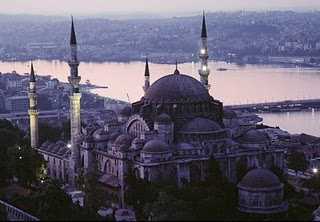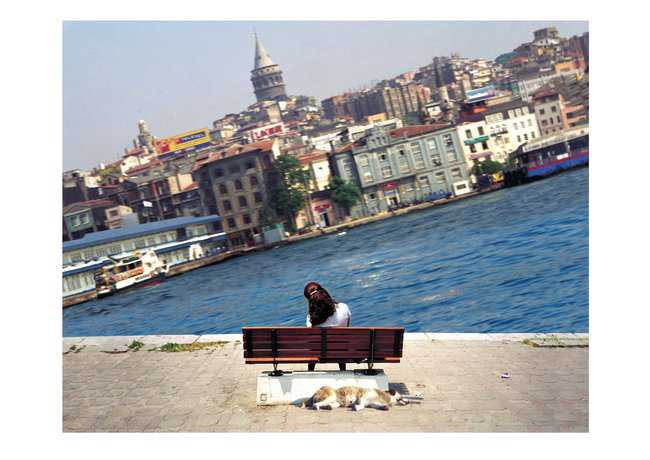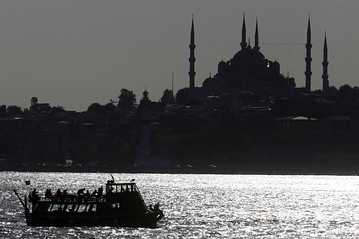Tulin Daloglu
Tuesday, October 7, 2008
Last week, the House stumbled before passing the bailout bill. But in the end, its way was eased by the overwhelming bipartisan approval of the Senate, which gave Treasury Secretary Hanry Paulson what he wanted, more or less. Whether it’s the best solution to the financial crisis is open to debate. Clearly, there is a kind of connection between the war in Iraq and the tumultuous markets. In this election season, the $600 billion already spent in Iraq and the ongoing $10 billion a month being spent there is under increased scrutiny.
But historically, the financial cost of a military action has never affected American will on the battlefield. “The antiwar people in Vietnam constantly talked about how much it was costing,” said John Mueller of Ohio State University at a recent event at the Brookings Institution. “But it’s basically blood that matters, actually being killed.” As the loss of American lives in Iraq significantly declined since the surge, Mr. Mueller argued, Americans’ approval or disapproval becomes less relevant; the people are able to tolerate it. “And so it may very well be that John McCain is right when he says we can stay there 100 years,” Mr. Mueller said. “Basically, if Americans aren’t being killed, no one cares in the least where they are.”
The key issue about the war is neither the monetary cost nor whether or not going to war was the right decision. There is no bringing back the more than 4,000 American lives or the hundreds of thousands of Iraqi lives lost. Sens. Barack Obama and John McCain differ on how they would end the war. Neither of their plans can assure the outcome. But the other countries of the region have no choice but to bear the burdens that the war has created there.
Turkey, for example, is a NATO ally of the United States – which has been attacked by Kurdish separatist terrorists who have found safe heaven in Iraq. Last week, the PKK once again attacked a Turkish border post, killing 15 Turkish soldiers. The funerals were held all over the country and broadcast live on Sunday, marking the end of Eid in this Muslim country and bringing together hundreds of thousands to pray for those lost in the attack. Such funerals have been seen in Turkish living rooms for more than 15 years now. Turks are fed up with this war; more than 30,000 of their people have been lost, and there is no end is in sight.
Occasionally, there are arguments about the cost of fighting terrorism. If there were peace, that money could be spent in the Kurdish areas, where the PKK attacks most often. It’s the same as the American arguments about what the money spent in Iraq could have funded. The Turkish state surely has not always fought the separatist Kurdish terrorists with the right tools. They refused to acknowledge the Kurdish reality for too long. Yet if this trouble were to require solely domestic solutions, the situation could be less discombobulated today.
Historically, the Western powers wanted to build an independent Kurdistan from the ashes of the Ottoman Empire – and that continues to haunt modern Turkey. Vahit Erdem, a member of the ruling Justice and Development party (AKP), told me in a recent interview in his Turkish Parliament office that the initial U.S. intention was to establish an independent Kurdish state. “But in time they saw it would create more trouble in the region than the Israeli-Palestinian conflict, [and] the U.S. changed its position,” Mr. Erdem said. “Now it sincerely supports Iraqi territorial integrity. In the beginning, they were – frankly – not supporting it.” Turkish public opinion has not yet been convinced, though.
Now, as the region watches the U.S. presidential election, it isn’t clear which candidate would be more sympathetic. Both candidates have pros and cons. But it’s clear that while the debate in Ankara focuses on stabilizing Iraq, continued cross-border PKK attacks on Turkey raise the possibility that Turkey will launch a major incursion into Iraq in pursuit of PKK terrorists. While the United States calls for restraint, it launches raids into Pakistan’s tribal beltway for the same reason: to pursue terrorists that carry attacks into Afghanistan. This is an incredible double standard. It would be wise for the United States to physically go after the PKK terrorists in the Iraqi territories.
While an independent Kurdistan will not be built by a rogue Kurdish terrorist group, a possible Turkish offensive which may not be limited to air strikes will halt Turkey’s accession talks with the European Union and strain its relationship with the United States. Then Turkey will be totally lost.
While it will take years to stabilize Iraq, the United States needs Turkey for the foreseeable future to protect its national interests.
Tulin Daloglu is a free-lance writer






